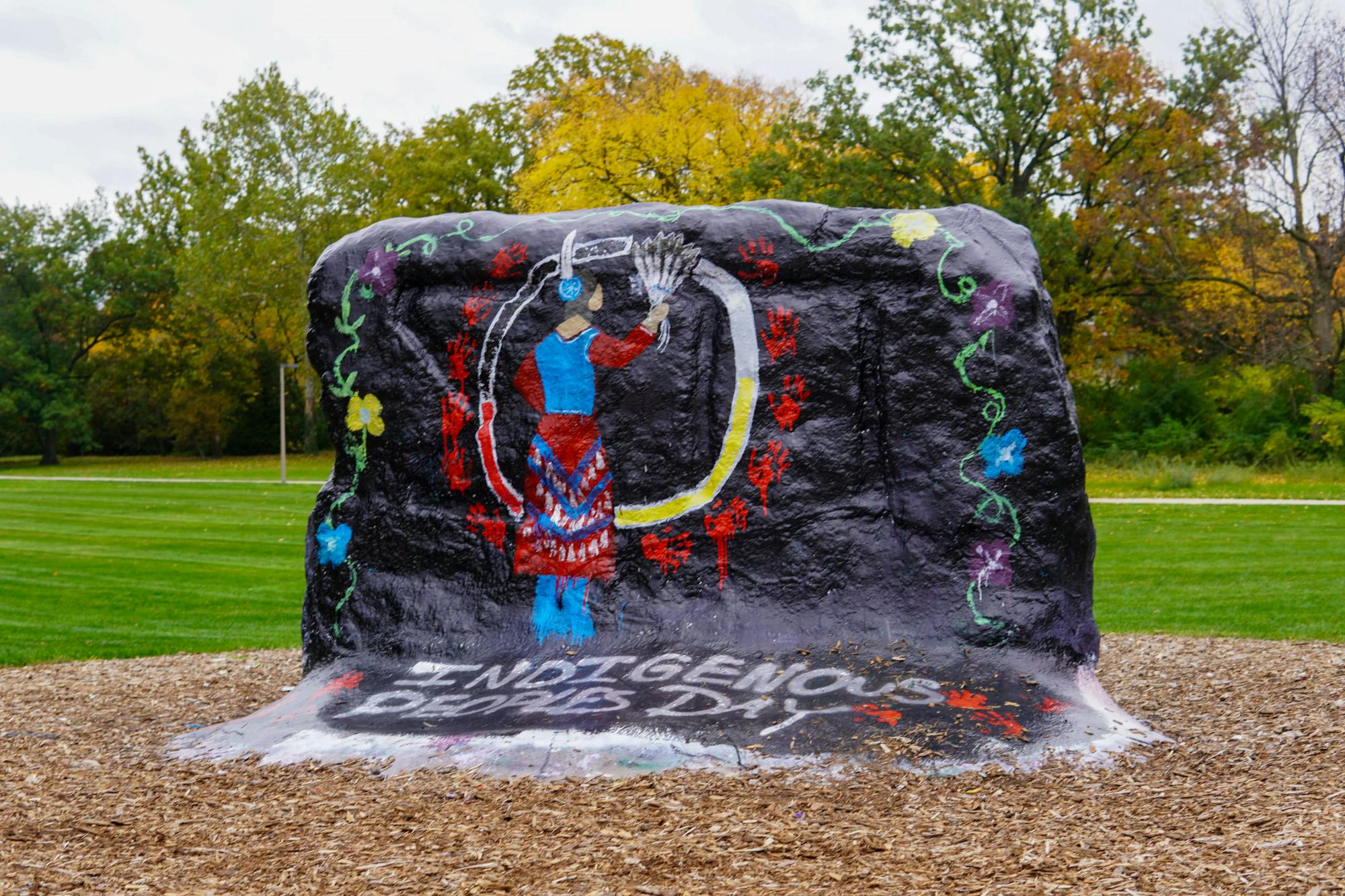Everyone knows the age-old rhyme, Christopher Columbus sailed the ocean blue in 1492. But, over 500 years since then, on the second Monday in October, two holidays with two distinctly different messages are now being celebrated across the United States. Columbus Day and Indigenous Peoples’ Day showcase a cultural shift that has occurred in many states across the country, Michigan included.
Columbus Day celebrates Christopher Columbus, an explorer who for many years was credited as the person who discovered America. The holiday was first celebrated in 1792, on the 300 year anniversary of the voyage that gained Columbus a legacy. The holiday was first observed federally in 1973, during Franklin D. Roosevelt’s presidency.
Deshawn Will, a child development student from Wayne, Michigan, remembers learning about Christopher Columbus on Columbus Day but never acknowledging Indigenous Peoples’ Day. “We did nothing for Indigenous Peoples’ Day ever,” Will said.
“I didn’t realize Indigenous Peoples’ Day was the same day as Columbus Day until about three years ago.”
Madelynn Shepard, an apparel and textile design student from Traverse City, Michigan, also had not learned about Indigenous Peoples’ Day until recently. But, she remembers being taught about Columbus in a way that was not very true to history.
“The way they taught us what happened, they sugar-coated it a lot and made it seem like Christopher Columbus came over and everybody was friendly … so it was really a celebration of him and they sugar-coated a lot of stuff,” Shepard said.
Similarly, Will remembers being taught that Columbus was a positive figure in history.
“I remember being taught he was an amazing man who came to this country to settle America and find a new place for people to call home,” Will said.
But Columbus did not discover America, the land that had long been inhabited by Native Americans. Coupled the treatment of those very Native Americans and the call for representation and celebration of those who initially inhabited America led to the creation of Indigenous Peoples’ Day.
Indigenous Peoples’ Day was first proposed as a replacement for Columbus Day in 1977, at the United Nations International Conference on Discrimination against Indigenous Populations in the Americas. Since then, 13 states have replaced Columbus Day with Indigenous Peoples’ Day, including Michigan.
In 2019, Governor Gretchen Whitmer declared that the state of Michigan would observe Indigenous Peoples’ Day on the second Monday of October. This came just three years after the city of East Lansing passed a policy resolution that led to the city officially recognizing Indigenous Peoples’ Day instead of Columbus Day.
In a land acknowledgment, The Native American Institute at Michigan State University says, “The land that MSU occupies is the ancestral, traditional and contemporary lands of the Anishinaabeg – the Three Fires Confederacy of Ojibwe, Odawa and Potawatomi peoples – that was ceded in the 1819 Treaty of Saginaw. The federal government often negotiated treaties with tribes under duress or in ways that legalized violent land seizures from Native people.”
The Native American Institute continues on about the 1829 Treaty of Saginaw, writing “The boundaries of the state of Michigan resulted from several land cessions from 1807 through 1842, and at that time Native people were forcibly removed from their land.”
Today, on Indigenous Peoples’ Day, The Rock was painted in celebration of the day. Michigan State University President Samuel L. Stanley Jr. posted a photo of the rock with the caption “Michigan State University was formed through ceded land from the 1819 Treaty of Saginaw and the 1862 Morrill Act. Today, we honor historic and contemporary Indigenous peoples. I encourage you to listen, learn, and rethink history.”
Both Will and Shepard have done their share of rethinking history, as Stanley suggested in his caption. For Will, he feels that Columbus Day should not be celebrated anywhere and that Indigenous Peoples’ Day should be the only holiday celebrated moving forward. “I feel like Indigenous Peoples’ Day should be the day we celebrate,” Will said. “I think Columbus Day should be removed off the calendar because Columbus Day celebrates a man who came and colonized an area and also brought death to many Native tribes and people who lived in America before he did.”
Shepard has also reexamined what she believes Columbus Day should look like, in a country that Columbus brought so much pain and suffering to. “I have very different feelings about it now,” Shepard said.
“I don’t think it should be a day of celebration. I think it should be a day where we acknowledge what Native Americans went through, and I think it should be more of a day of apologizing… I don’t think it should be a celebration”
Today, there are multiple events in celebration of Indigenous Peoples’ Day. The first event is a panel that will be led by Native researchers and practitioners in the Big Ten. This panel is titled, “Sovereignty and Indigeneity in the Big Ten: Telling Our Stories” and is described as a chance to hear about Native experiences in academia from multiple Native panelists in the Big Ten. This event will take place tonight, from 4:00-5:30 EST over Zoom.
The second event, which is being put on by the American Indian and Indigenous Studies department, is titled "Native MSU Welcome and Indigenous Peoples’ Day Celebration." This event will take place tonight on Zoom from 6:00-8:00 EDT and is described as an opportunity to virtually meet and get to know the Native MSU community.
Support student media!
Please consider donating to The State News and help fund the future of journalism.
Discussion
Share and discuss “From Columbus Day to Indigenous Peoples' Day, MSU community supports cultural shift” on social media.




